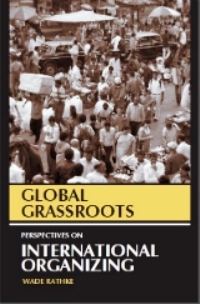Mutant Modernities: An Excerpt from the Nagarjuna University Lecture given by Ravi Sinha
Guntur, Andhra Pradesh, India
Using the term mutant in the context of modernity, even if metaphorically, calls for qualifications. Mutations are random changes in genes that can produce new traits in an organism. Genetic changes can arise spontaneously and randomly during the normal genetic processes of replication, or they can be induced by external factors present in the environment (viruses, chemicals, radiation etc). A mutant is a member of a species that is physically different from the typical members of the species, the difference resulting from the new traits arising out of mutation. In the natural world of organisms, then, a mutant can be treated as a deviation from the typical. In the metaphorical usage of this term in the context of modernity, one may ask, which of the modern societies are to be considered as the typical?
This can be a controversial issue. There can be views which would equate the typical with the original. Modernity, whichever way it is defined, did emerge in the Northwestern Europe before anywhere else. One may think of the West European model as the original model. The trouble is that this model is not one. Countries of the Western Europe, despite recent moves towards integration of one kind or another, show significant variations around the general theme of modernity. If the examples are expanded to include other industrially developed societies, such as in North America or in Japan, then the variations are much more pronounced.
But the story does not end there. Societies of most countries on this planet have become modern, and each one of them is modern in its own specific way. Their histories cannot be traced to an original or a classical model; their typology cannot easily be systematized. Despite famous theories of convergence, which expected all societies of the world to become progressively like those in the west, the spread of modernity, even after the onset of so-called globalization, has not been able to homogenize the world. This has been taken by some as a grand failure of the project of modernity, while others have come to believe that one can talk about modernity only in the plural. The latter position would hold that there are as many modernities as there are modern societies; one can say that the contemporary world contains multiple modernities.
I argue in favour of a position that falls somewhere in between, although it may appear to be indistinguishable from the latter position. In the case being made here, there are no typical members of the species. All embodied and actually existing modernities will be taken as mutant modernities. What, then, is to be gained from using this metaphor? Why could one not just go with the usage of the term “Multiple Modernities”?
At the descriptive level, it would perhaps make no difference. The purpose behind using the term “Mutant Modernities”, however, is to emphasize the process through which the generative features of modernity – whichever way they are identified – give rise to different embodiments Nagarjuna University Lecture Ravi Sinha of modernity. The emphasis here is on the processes, structures and environs through which the genetic code, so to speak, gives rise to the specific traits of the embodied organism.
This is far from being a case of definitional hairsplitting. It is important substantively as well as methodologically, and it has important political implications. For example, at the substantive level one might ask, what is it that mutates when modernity takes various embodied forms? Methodologically, can one decipher the genetic code from analyzing a mutant or from comparing different ones? Can one construct, at least theoretically, the shape of the perfect organism that should emerge from the code and compare a mutant form against the ideal one? At the practical and political level, one may ask, does this give us a way to choose what would be a better system, society or way of life?
Classical theories of modernity did attempt to decipher such a genetic code. In these analyses, the role of base molecules, so to speak, was played by two concepts that were taken to be entwined in this code – autonomy and rationalization. Autonomy referred to the emergence of humanity from the shadows of religion, tradition, custom and communities. Rather than thinking as religion would have them think, humans began to think for themselves; rather than living as tradition would prescribe, they began to live in newer ways; rather than remaining subsumed in the community, they began to emerge as individuals. Immanuel Kant described it as humanity’s gaining of maturity.
Rationalization, on the other hand, referred to reorganizing the society and the way of life according to the principles of reason. Philosophers differed about the nature, the source and the seat of reason, but there was enough agreement about what it was and how it could be contrasted with dogma, faith and superstition. More importantly, the understanding of reason kept evolving through the history of modern philosophy. Cartesian paradigm of subject centered reason, with the solitary thinker as the source of trustworthy knowledge, continued as the dominant paradigm all the way to Kant for whom knowledge, in spite of its connections to the external world, remained grounded in the consciousness of the individual self. Hegel questioned this subjectivist orientation and argued that structures of consciousness are socially and historically constructed. Reason, of a given era or at any given time, is the historical and social achievement of humanity and it is going to continually improve through the dynamics of history driven dialectically by the defects of contemporary reason as compared to the perfect one – the latter, according to Hegel, being encoded in the Absolute Idea waiting for humanity at the end of history. Discounting Hegel’s philosophical idealism and his political conservatism flowing out of a method in which history always justifies the present, his contribution was to put real flesh on the emaciated subject centered reason of Descartes and Kant which could hardly keep standing.
In the story of reason, if Kant brought in the individual endowed with the critical faculties and freed from custom and community and Hegel brought in society and history as the makers of the social individual, then Marx completed the picture by bringing in Nature and the entirety of the material world. He insisted that “mind is not the ground of nature but nature that of mind; he Nagarjuna University Lecture Ravi Sinha stressed that human consciousness is essentially embodied and practical and argued that forms of consciousness are an encoded representation of forms of social reproduction.” The individual is social and, in part, socially constructed; society is coming together of the socialized individuals (social relations of production) to deal with Nature and with the material world to ensure reproduction of material and social condition of life at a progressively higher level (development of productive forces); the material world, the society and the individual are ceaselessly interactive and operative in making and remaking each other; and in this process the totality, through its own internal dynamics, keeps constituting and reconstituting itself. The philosophical discourse of reason would continue after Marx and long after the classical era is concluded, and it would continue to glean fresh insights into the nature of reason from a variety of sources,13 but, after Marx, there is hardly anything big to be added to the big picture.
In all this, a point of methodological importance needs to be kept in view. When one is trying to decipher the genetic code of modernity through philosophical toil, one is engaged in something akin to post-mortem; one is reading history backwards. This is very different from making history or influencing it in any big way. The fruits of such philosophical toil may feed into live history – history in the making – but its influence will at best be minor and indirect. Modernity has unfolded in history the way it has and taken its multiple embodied forms that we actually see not because of Descartes, Kant, Hegel or Marx. It has unfolded as a result of the generative mechanisms arising out of modernity’s own genetic code. Those legendary philosophers did not will into existence what has been described as autonomy and rationalization. They merely saw these at work in the life processes of embodied modernities.
The practical implications, therefore, of “roads not taken” while they were philosophically available should not be blown out of proportion. It would not have, for example, made much difference to history if the philosophical tradition of Spinoza and Marx that spurns the Cartesian section and does not drive a wedge between Body and Mind were to prevail intellectually over that of Descartes and Kant that does so. Or, to put it another way, there were substantive reasons in history for the latter to prevail over the former. Modernity, although a concept or entity very different from capitalism, was nevertheless conjoint with it at birth and its unfolding so far has happened in a world that has been capitalism’s playground. The worship of individualism, private property, market, bourgeois democracy and in general of bourgeois liberal ideology has arisen in the course of actual history and not from taking the wrong philosophical turn. Similar comments would apply if one were to imagine that replacing the subject-centered understanding of reason by the inter-subjective one, or taking up “a hermeneutic dialogue with other cultures and epochs about the common concerns of human life; or, perhaps, a genealogical unmasking of any pretense to universal validity” would in any significant way change the future course of history.
It is instructive to note, in this context, that Marx, after making his seminal contribution to philosophy and after realizing the relative disempowering of philosophy brought about by empirical and scientific investigations of the social systems and of Nature – a development not Nagarjuna University Lecture Ravi Sinha unconnected with flowering of modernity and development of capitalism – moved away from philosophy to the study of the capitalist system. This study was inspired by his theoretical and philosophical framework, but it was not a philosophical discourse. It was a concrete investigation of a concrete system. One may ask, why did he choose to study a system, rather than, say, a culture, a country, or history of technology? The answer lies in the special role played by system in the social totality.
System has not always been sufficiently differentiated and separately identifiable within the social totality. Such a differentiation is a characteristic feature of modernity. If it is often seen as a characteristic feature of capitalism, that is because capitalism is often equated with modernity. Even among those critics of capitalism who would like to replace it with socialism, such a conflation of capitalism and modernity leads to a viewpoint that the social differentiation characteristic of modern societies must be undone and, under socialism society must once again become an integrated and organic whole. The relatively integrated character of the social totality in the pre-modern times comes in clear view when compared to the increasingly differentiated make-up of a modern society. This differentiation is a much studied subject. From Hobbes, Smith and Marx through Durkheim and Weber to Adorno, Parsons and Habermas have all studied it in its different aspects and from their different perspectives.
One illustrative way to describe the complex process of differentiation has been to compare the organic character of Community (Gemeinschaft) with the rational and contractual character of Association (Gesellschaft). The transition from society as community to society as coordinated network of associations and institutions has been seen variously as a loss, as a progress, and as something in between about which one can only have an ambivalent attitude. Alex Callinicos refers to Ferdinand Tonnies as a typical example of the first kind, “Tonnies regarded the transition from one kind of society to another as essentially a process of loss: individuals in pre-modern Gemeinschaft were bound into the social whole by a series of primarily affective connections; social relationships in modern Gesellschaft are cold and egoistic, based on individuals’ rational calculations of their interests.”
Comte, Spencer and Durkheim, on the other hand, considered this differentiation to be at the root of a progressive social evolution leading to better social arrangements, although there were important differences among them. In Comte’s schema establishment of consensus was key to prevent the danger of social disintegration posed by differentiation, whereas Spencer held the system of free market as the best way to have a society ensuring individual freedom. Durkheim, on the other hand, was far from being an unthinking importer of evolutionary theory into the social realm. In his thinking, division of labour and the resultant social differentiation give rise to a new kind of organic solidarity in the society. In fact, division of labour simultaneously creates conditions for increased independence of the individual and of increased social solidarity.
Marx had a very complex and often ambivalent attitude, evidence of which is scattered in different places in his writings. His trenchant criticism of capitalism for its barbaric conduct Nagarjuna University Lecture Ravi Sinha while destroying pre-modern forms of life coexists with his disdain for Asiatic inertia and rural idiocy. At a much later time, a comparable ambivalence is witnessed in Jurgen Habermas who proposes to view society simultaneously as a system and as a lifeworld and locates the pathologies of a modernity that dwells on subjectivist reason and flourishes under capitalism in the processes of system’s colonization of the lifeworld.
The complex and long-winded intellectual history of the study of social differentiation under modernity cannot be summarized satisfactorily in the time and space available here. Taking a practical approach reasonably informed by this history, one can say that the modernist social differentiation, in its broad outlines, is roughly based on making a distinction between economy, polity and society – society being used here not in the sense of social totality but representing only the part left over after economy and polity are separated from it. This differentiation of the society into three separate, though interconnected, spheres is actualized through emergence of corresponding sub-systems and institutions. These take clearly identifiable definite shapes mainly in the economy and polity parts, although the residual social part is not altogether devoid of its own kinds of institutions. Taking this practical approach further, the system part of the social totality – what has been called the system without defining it thus far – can be taken as comprising of the economy and the polity. This may not be fully accurate or consistent as both economy and polity are inextricably entangled in the social totality. In a more careful analysis one may have to distinguish the rational-formal-legal-institutional parts of the economy and polity from the parts that are soluble in the social fluid and take the former as playing the constitutive role in the differentiation of the system from the rest of the society. But, for the argument I am going to make here the present level of care will suffice.
In the Marxist political economy, understanding of system is correlated with the understanding of the term, mode of production. A system arises out of a mode of production and corresponds to that mode of production. Capitalist system, for example, is based on the capitalist mode of production. However, just as in the case of modernity, there is a serious dose of abstraction involved here. A capitalist mode of production is an abstract category distilled from manifold embodied forms of capitalism that may appear very different from each other. Capitalism, or any other mode of production for that matter, never gets a clean slate to write its rules on. Even in cases where it may be implanted from outside, it must grow in the womb of the host society. The make-up and the history of the pre-existing society co-determines, along with the genetic code of capitalism, the shape of the embodied capitalism as it grows in that society. In a way, all capitalisms too are mutant capitalisms.
Marxist method has often been vulgarized by Marxists themselves. When Marx chose to move away from the philosophical discourse of consciousness that is socialized and naturalized at the same time, and embarked on an empirical-scientific study of the capitalist system, he did not do so in order to derive the society from the mode of production, or to derive the organism from the genetic code. There was a dual reason behind this choice – one methodological and the other practical-programmatic.
The methodological reason lies in the fact that if one wishes to study social formations and gain insights into the forces animating the flow of history, the best place to start is the system part of the social totality. System is the more active part; the non-system part mostly plays the role of environment for the system. Marxist method is especially successful in the study of the system part. Within the system, the role of the economic-material is taken to be the basic one, on which rises the political superstructure that can be shown to be in dialectical relationship with the economic-material base. One can, perhaps, also identify a part of the ideological superstructure that falls within the system and corresponds to the given economic-material base. But this should not be confused with the non-system part which contains most of the cultural and civilizational domain of a social totality. It is a misuse or vulgarization of the Marxist method when one puts the system and the non-system parts in as tight a dialectical embrace with each other as one does for the material and non-material components within the system. The system part does interact with the non-system part. After all they are part of the same social totality. But this dynamics is much weaker and of its characteristic time-scale is much longer as compared to the dynamics within the system. The constituents of the system live in a far tighter dialectical embrace with each other. This is the main reason behind civilizations retaining their distinct identities over historical periods much longer than the lifetimes of systems they envelope and harbour. Systems change faster than civilizations do.
The practical-programmatic reason for undertaking the study of the system is related to the methodological one. First of all, it is far easier to intervene in a system than in a culture or a civilization. More importantly, intervening in the system is a far more effective way to intervene in history and change its direction. History is made by throwing a spanner in the works of a system that has exhausted its historically progressive role and can be replaced by a better system. This will create ripples, at times strong ones, in the non-system part too. The cultural-civilizational domain will not remain unaffected. A progressive and emancipatory transformation of the social totality would have been triggered from within.
How does one decide in which direction history is to be nudged or pushed? How does one envision and design the new system? This brings me to the main argument I wish to make.











